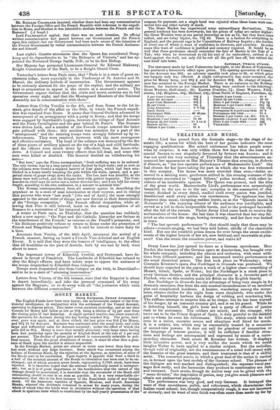Letters from Civita Vecchia to the 4th, and from Rome
to the 1st in- stant, give details of the affair on the 30th, in which the French expedi- tion was repulsed from Rome. It seems that General Oudinot advanced in consequence of an arrangement with a party in Rome; and that his troops were engaged by Garribaldi's Legion, between the village of Sant' Antonio and the Porta Cavallegiere and the gate behind St. Peter's. The Romans were driven back, and a number of the French troops entered the latter gate pellmell with them; this accident was mistaken for a part of the "arrangement," and the entering troops were strongly followed up by re- inforcements. They were received, however, with the most courageous and effective resistance. The head of the column was destroyed by the fire of three pieces of artillery placed on the top of a high and solid barricade, and the officers were struck down by rifle-shots from the house-win- dows. A Colonel and some twenty officers thus fell dead, and some 600 men were killed or disabled. The General decided on withdrawing his men-
" But here," says the Times correspondent, " fresh suffering was to be endured. The only retreat was by a long narrow road, flanked by high walls; and as soon as the columns were formed a masked battery of fear guns, which had been esta- blished in a house nearly touching the gate within the walls, opened, and a per- petual storm of grape swept down the ranks. The loss here was dreadful, as the pieces were well served, and the Romans fired with perfect impunity. The Com- mander-in-chief says he never saw a better-directed fire; and I am told his enemy fought, according to his own confession, in a manner to astonish him."
The Roman correspondence from all sources agrees in describing the populace as in a state of mad intoxication at their success, and in stating that persons who were "last week" [the end of April] the most strongly opposed to the actual order of things, are now fiercest in their denunciation of the "foreign occupation." The French official despatches, while al- lowing that Pius is still beloved, insist on the strong opposition of all Romans to a restoration of his temporal rule.
A writer in Paris says, on Thursday, that the question has suddenly taken a new aspect: " the Pope and the Catholic hierarchy are furious at the interference of the French," as ruinous to the Pontiffs prospects; and " his Holiness positively refuses to return to Rome under the protection of French and Neapolitan bayonets." It is said he intends to leave Italy for a time.
Accounts from Venice, of the 26th April, announce the arrival of a French steamer, having on board a French Vice-Admiral and an English Envoy. It is said that they were the bearers of intelligence, to the effect that all hostilities on the part of Austria, both by sea and by land, were about to cease.


























 Previous page
Previous page